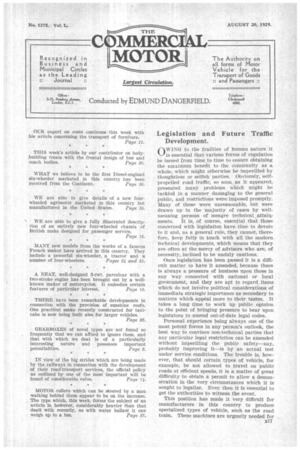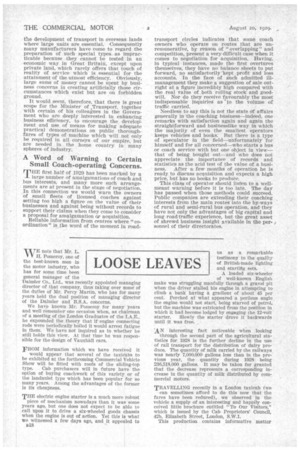Legislation and Future Traffic Development.
Page 43

Page 44

If you've noticed an error in this article please click here to report it so we can fix it.
()WING to the frailties of human nature it ‘-"is essential that various forms of regulation be issued from time to time to ensure obtaining the maximum benefit to the community as a whole, which might otherwise be imperilled by thoughtless or selfish parties. Obviously, selfpropelled road traffic, so soon as it appeared, presented many problems which might be tackled in a manner damaging to the general public, and restrictions were imposed promptly. Many of these were unreasonable, but were drawn up in the majority of cases by wellmeaning persons of meagre technical ,attain ments. It is, of course, essential that those concerned with legislation have time to devote to it and, as a general rule, they cannot, therefore, keep fully in touch with all the modern technical developments, which means that they are often at the mercy of advisors who are, of necessity, inclined to be unduly cautious.
Once legislation has been passed it is a difficult matter to have it amended, because there is always a pressure of business upon those in any way connected with national or local government, and they are apt to regard_ items which do not involve political considerations of immediate strategic importance as secondary to matters which appeal more to their tastes. It takes a long time to work up public opinion to the point of bringing pressure to bear upon legislators to amend out-of-date legal codes.
Personal experience being always one of the most potent forces in any person's outlook, the best way to convince non-technical parties that any particular legal restriction can be amended without imperilling the public safety—nay, probably improving it—is by an actual test under service conditions. The trouble is, however, that should certain types of vehicle, for example, be not allowed to travel on public roads at efficient speeds, it is a matter of great difficulty to obtain a permit to allow a demonstration in the very circumstances which it is sought to legalize. Even then it is essential to get the authorities to witness the event.
This position has made it very difficult for manufacturers in this country to produce specialized types of vehicle, such as the road train. These machines are urgently needed for the development of transport in overseas lands where large units are essential. Consequently many manufacturers have come to regard the preparation of such special types as impracticable because . they cannot be tested in an economic way in Great Britain, except upon private land, which rarely offers that touch of reality of service which is essential for the attainment of the utmost efficiency. Obviously, large sums of money cannot be spent by business concerns in creating artificially those circumstances which exist but are on forbidden ground.
It would seem, therefore, that there is great scope for the Minister of :Transport, together with certain of his colleagues in the Government who are deeply interested •in enhancing business efficiency, to encourage the develop-ment and use of means for making adequate practical demonstrations on public thoroughfares of types of machine which will not only be required in all corners of our empire, but are needed in the home country hi many spheres of industry.
A Word of Warning to Certain Small Coach-operating Concerns.
THE first half of 1929 has been marked by a large number of amalgamations of coach and .bus interests, and many more such arrangements are at present in the stage of negotiation. In this connection we would warn the owners of small fleets of licensed coaches against setting too high a figure on the value of their businesses and against being without records to support their claims when they come to consider a proposal for amalgamation at' acquisition. Reliable information from centres where " coordination " is the word of the moment in road
transport circles indicates that some coach owners who operate on routes that are unremunerative, by reason of "overlapping" and competition, present a very difficult case when it comes to negotiation for acquisition. Having, In typical instances, made the first overtures themselves, they have no balance sheets to put forward, no satisfactorily kept profit and loss accounts. In the face of such admitted illmanagement they make a suggestion of sale outright at a figure incredibly high compared with the real value of both rolling stock and goodwill. Nor do they receive favourably the most indispensable inquiries as to the volume of traffic carried.
Needless to say this is not the state of affairs generally in the coaching business—indeed, one remarks with satisfaction again and again the straightforward and businesslike way in which the majority of even the smallest operators keeps vehicles and books. But there is a type of speculator in the field—unfortunately for himself and for all concerned—who starts a bus or coach service with but one• object in view— that of being bought out—and who does not appreciate the importance of records and statistics as the acid test of the value of a business. After a few months of operation he is ready, to discuss acquisition and expects a high price, but has no books to produce.
This class of operator should listen to a wellmeant warning before it is too late. The day has passed when those methods could succeed. Public companies are extending their coaching interests from the main routes into the by-ways of rural and semi-rural bus operation, and they have not only the advantages of big capital and long road traffic experience, but the great asset of shrewd business insight available in the personnel of their directorates.




















































































































